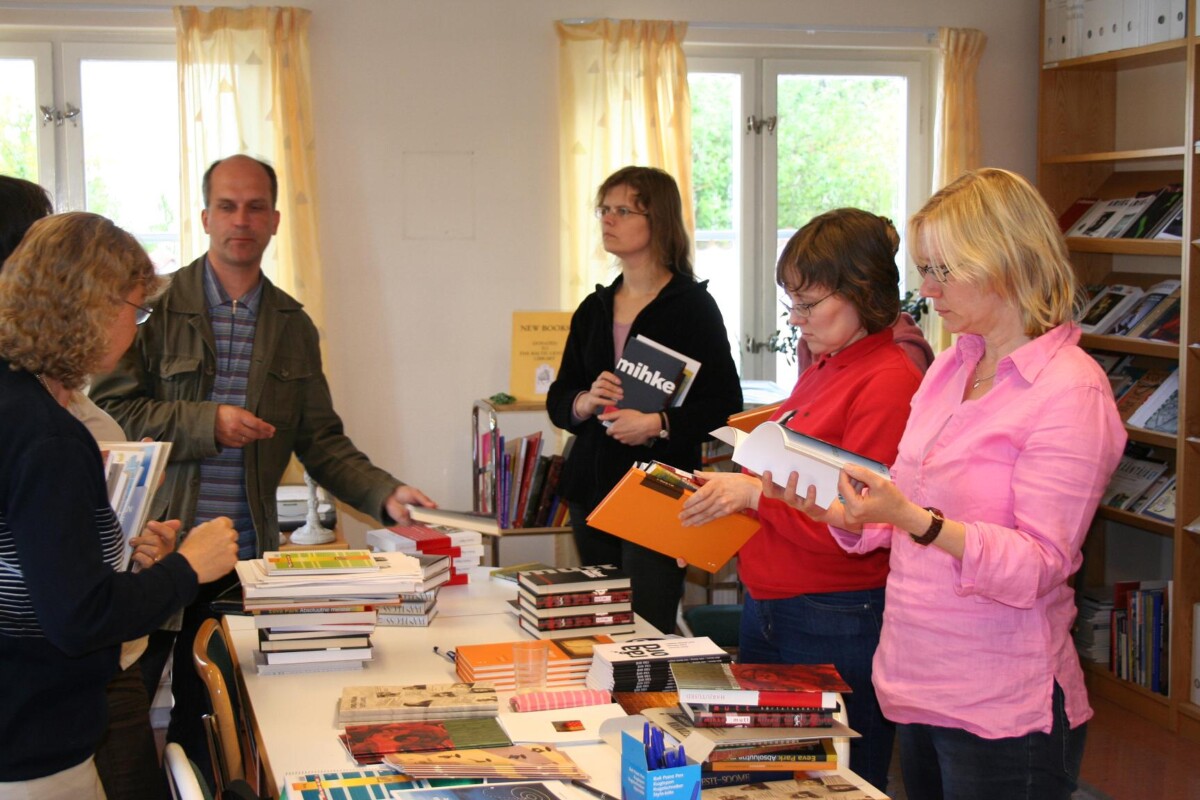On a beautiful Thursday in May, eight translators-to-be convened in the city of Visby for a three day seminar on how to translate Estonian literature into Swedish. The scene of the seminar is also worth mentioning. Visby is located on the Swedish island of Gotland. Gotland is very close to the middle of the Baltic Sea, thus being a suitable location for the Baltic Centre for Writers and Translators, founded in 1993. Visby is a very beautiful town with roots in medieval times; large parts of the medieval town wall have been preserved. The BCWT consists of two small houses, a dormitory with eleven rooms and a convention building with a dining /meeting room, kitchen and living room, and walls covered with bookshelves containing literature from countries around the Baltic Sea.
The seminar was arranged by the Estonian Literature Information Centre to promote interest and competence in translating from Estonian to Swedish. The need for translators is underscored by the Swedish book expo 2007, where the focus is on Estonian literature. Interest in the seminar was high. Over twenty people contacted the centre to receive the two excerpts from Estonian books to be translated from Estonian to Swedish as a qualification test for the seminar. Not surprisingly it turned out that many of the eight most qualified participants had some kind of background in writing, studies in Estonian, journalism or interpretation. The seminar was chaired by Enel Melberg and Kalli Klement, both Swedish Estonians who are experienced translators. ELIC representatives, lead by Ilvi Liive, provided the logistics for the seminar.
All in all, it was a good mix of different topics pertaining to the translation of literature. The seminar started off with analysis of the qualification texts, and it very soon became obvious that there is rarely only one correct translation. This was further emphasised by examples of a dozen different translations into Swedish of a famous poem by Goethe, Über allen Gipfeln. The theories on this were explained by Lars Kleberg from the Swedish University of Södertörn. Lars is an interpreter and professor of Russian. From his lectures it was possible to conclude that he actually could be a professor of translation. He was able to make complicated issues very clear. The hunger for knowledge of the participants, in the translation area, was not satisfied by his few lectures. Unfortunately a seminar is always a compromise between total time and a mix of different subjects. It should be stated that by no means could the other topics have
been assigned fewer hours. Knowledge of Estonian was provided by Krista Kerge from Tallinn University. As a basic understanding of the Estonian language by participants was assumed, she concentrated on other aspects, among these numeric analyses of texts. There were examples of fluctuations in the number of words in a sentence over the decades, and frequency tables on words in literary texts. Also, different types of language were highlighted: daily spoken language, legal language, correct common written language etc. An understanding of these basic distinctions is essential for a translator to create the correct ‘feeling’ in a translation.
Mart Velsker, a professor of Estonian literature from the University of Tartu pointed out that the selection of written texts is also part of the translation process. In just a few lectures he gave a surprisingly comprehensive overview of Estonian literature, with emphasis on recent decades. The documentation was as exemplary as Krista Kerge’s; otherwise one could have easily got lost in the massive lists of Estonian writers. The seminar was rounded off with another practical exercise in translating a few pages of Mati Unt’s Sügisball (Autumn Ball), which was then compared to a published translation in Swedish. Here it became apparent that writers just write, and are maybe not always conscious of a text being factually correct. (This of course is not necessary.) Not even native Estonians had a clue what a ‘back-door window’ actually meant. Evenings were spent partying, and the topic of conversations was, of course, not sports or politics, but literature and the difficulties of translation. The seminar was a very intense and rewarding experience and achieved its goals. The participants left with the feeling ‘I want to do translations and maybe I can now.’
© ELM no 23, autumn 2006


